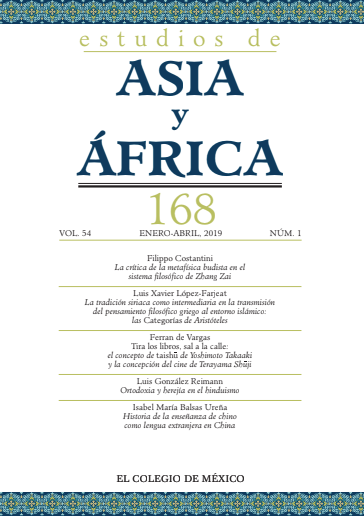Resumen
Una de las ideas principales que caracteriza el movimiento de renovación confuciana del siglo XI es la necesidad de eliminar la influencia que las doctrinas heterodoxas ejercen sobre los intelectuales. La mayoría de los filósofos confucianos tratan de volver al pensamiento original de Confucio rechazando directamente las teorías daoístas y sobre todo budistas. En este contexto, el filósofo Song Zhang Zai representa uno de los ejemplos más significativos. Aquí mostraré cómo el rechazo de la doctrina budista no sólo es un aspecto importante en el pensamiento de Zhang Zai, sino que representa el fundamento de sus teorías metafísicas y éticas.
Referencias
ANGLE, Stephen J. and TIWALD, Justin, Neo-Confucianism: A Philosophical Introduction, Cambridge, UK: Polity Press, 2017.
BOL, Peter K., Neo-Confucianism in History, Harvard University Asia Center, 2008.
CHAN, Wing-Cheuk, Mou Zongsan and Tang Junyi on Zhang Zai's and Wang Fuzhi's Philosophies of Qi: A Critical Reflection, Dao: A Journal of Comparative Philosophy 10, 2011.
CHENG, Chung-Ying, On the Metaphysical Significance of Ti (Body‐Embodiment) in Chinese Philosophy: Benti (Origin‐Substance) and Ti‐Yong,” Journal of Chinese Philosophy 29:2, 2002.
COSTANTINI, Filippo, La Armonía Suprema. Analisis del concepto de armonía en el pensamiento cosmológico, ético y social de Zhang Zai 张载 (1020-1078). Estudios de Asia y África, 49, 2013.
DING, Weixiang 丁为祥, Zhang Zai weishenme zhu “Zhengmeng” 张载为什么著 “正蒙”, Zhexue yanjiu di 4 qi 哲学研究第 4 期, 2007.
DING, Wei Xiang, WANG, Robin R., Zhang Zai's Theory of Vital Energy, in Makeham, J. (ed.), Dao Companion to Neo-Confucian Philosophy, pp. 39-56, New York: Springer, 2010.
FEUILLAS, Stephane, Penser par contraste. Critique du bouddhisme etstratégies discursives dans le Zhengmeng de Zhang Zai (1020-1078).
Extrême-Orient,Extrême-Occident, 26, 2004.
HENDERSON, John, B., The Development and Decline of Chinese Cosmology, New York: Columbia University Press, 1984.
HOU Wailu侯外庐, QIU Hansheng邱汉生、ZHANG Qizhi.张岂之, Song Ming Lixue shi 宋明理学史. Beijing: Renmin Chubanshe 人民出版社, 2005.
KASOFF, Ira, The Thought of Chang Tsai (1020-1077), Cambridge University Press, 1984.
KIM, Jung-Yeup, Zhang Zai's Philosophy of Qi: A Practical Understanding, Lexington Books, 2015.
LEBLANC, Charles, From Cosmology to Ontology through Resonance: a Chinese Interpretation of Reality, en Bibes, G., Corin, E. (ed.), Beyond Textuality: Asceticism and Violence in Anthropological Interpretation, pp. 57-78. Berlin/New York: Mouton de Gruyter, 1995.
LIU, Jeeloo, Neo-Confucianism: Metaphysics, Mind, and Morality, California State University, Fullerton CA: Wiley-Blackwell, 2018.
PATT-SHAMIR, Galia, Filial Piety, Vital Power, and a Moral Sense of Immortality in Zhang Zai’s Philosophy, Dao: A Journal of Comparative Philosophy. 11:2, 2012.
PUETT, Michael J., The Ethics of Responding Properly. The Notion of Qing in Early Chinese Thought. In Eifring, H. (ed.) Love and Emotions in Traditional Chinese Literature, pp. 37-68, Leiden/Boston: Brill, 2004.
STURGEON, Donald, Chinese Text Project. http://ctext.org, 2011.
TANG, Chun I, Chang T’sai’s Theory of Mind and its Metaphysical Basis, Philosophy East and West, 6:2, 1956.
WANG Fuzhi 王夫之, Zhangzi Zhengmeng zhu 張子正蒙注, Shanghai: Shang Hai guji chubanshe 上海古籍出版社, 2000.
WANG, Robin R., Yinyang: The Way of Heaven and Earth in Chinese Thought and Cultur, Cambridge, Eng.: Cambridge University Press, 2012.
ZIPORYN, Brooke, Harmony as Substance Zhang Zai's Metaphysics of Polar Relations, In Li, C.Y., Perkins, F. (ed.), Chinese Metaphysics and its Problems, pp. 171-191, Cambridge, Eng.: Cambridge University Press, 2015.
ZHANG, Zai 张载, Zhang Zai ji 张载集, Zhonghua shuju Beijing 中华书局北京. 1978.
Esta obra está bajo una licencia internacional Creative Commons Atribución-NoComercial-SinDerivadas 4.0.
Derechos de autor 2022 Estudios de Asia y África


